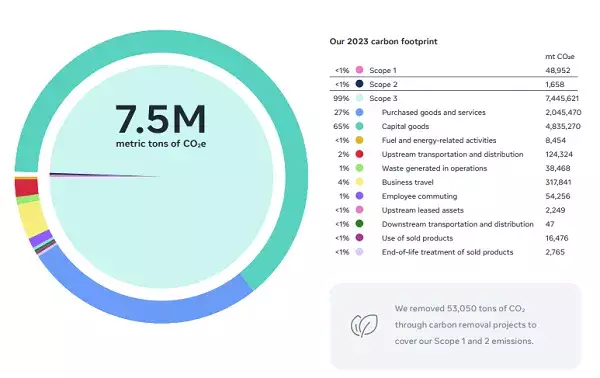Meta, the tech giant formerly known as Facebook, recently released its “Responsible Business Practices Report,” a document brimming with revelations about its operations and ambitions. Spanning 144 pages, the report serves as a self-reflective account of Meta’s endeavors pertaining to artificial intelligence (AI), environmental considerations, and its overarching vision for the metaverse. This multifaceted analysis underscores not only the company’s aspirations but also invites scrutiny regarding its claims of responsibility and progress.
At the heart of the report lies a significant emphasis on AI, showcasing Meta’s commitment to integrating cutting-edge generative AI models throughout its various platforms. While the company promotes an ideology of democratizing AI access, there’s an undercurrent of concern that such integration could exacerbate existing inequalities. If advancements in AI tools are available to select regions while others lag behind, the potential societal divide may widen, leading to significant economic imbalances. The drive for universal AI accessibility raises ethical questions about who controls the technology and how it is deployed.
Moreover, Meta’s assertion that it seeks to transition beyond flat, two-dimensional experiences into immersive augmented and virtual reality (AR/VR) solutions promotes an idealized vision of technology as a connective force. However, this rhetoric must be met with skepticism, as the actualization of the metaverse may not be as inclusive or beneficial as the company projects. Skepticism arises from the understanding that technologies designed for immersive connection could also serve as avenues for deeper alienation and isolation.
Meta’s report highlights its investment of over $5.5 billion in privacy initiatives since 2019, emphasizing a proactive approach to data security and ethical product design. While this is a commendable effort, it’s crucial to recognize that past scandals, including data breaches and the misuse of user information, cast a long shadow over its credibility. The company’s historic missteps showcase the challenges of embedding privacy into rapidly evolving products without compromising user experience or engagement.
Additionally, the mention of a rigorous privacy program sounds promising on paper. However, the effectiveness of such programs is often put to the test in real-world implications and unforeseen challenges. Meta must not only develop robust privacy protocols but also ensure that these systems are transparent and accountable to its users.
One of the more contentious aspects of the report is Meta’s political engagement through its Political Action Committee (PAC). While the company states that it supports candidates aligned with its policy-focused intentions, this declaration risks portraying an image of bias and selectivity in democratic participation. Notably, while CEO Mark Zuckerberg refrains from publicly endorsing candidates for the upcoming U.S. Presidential election, the existence of MetaPAC raises questions about the implications of corporate influences on political structures.
This section of the report reveals a tension between operating under the guise of social responsibility and wielding significant influence in political arenas. Stakeholders may argue that corporations should maintain a degree of separation from electoral politics to safeguard democratic integrity. An examination of how Meta navigates this landscape will be critical in assessing its genuine commitment to ethical governance.
In tandem with its technological advancements, Meta discusses its environmental and social impact initiatives, suggesting a holistic approach to corporate responsibility. While the company outlines its progress in reducing its carbon footprint and promoting diversity among suppliers, skepticism remains regarding the sincerity and thoroughness of these efforts. Compounding these issues is the scrutiny Meta faces over its contributions to societal issues, including data misuse and promoting divisive rhetoric on its platforms.
The company’s ambitions align with broader global objectives aimed at improving social equity and environmental sustainability. Yet, it is essential to scrutinize whether these ideals permeate everyday operations, or if they serve merely as public relations fodder aimed at polishing Meta’s image in a turbulent climate.
Meta’s “Responsible Business Practices Report” invites a critical examination of its narrative as a socially responsible entity striving for progress in an ever-evolving digital society. While the intentions surrounding AI democratization, privacy enhancement, and sustainability are praiseworthy, the path taken is fraught with complexities. As Meta continues on its quest to innovate and shape the digital landscape, it must address the inherent contradictions and challenges that come with such ambition. Only through transparent and sincere actions can the company mitigate the risks associated with its rapid growth and societal impact, ultimately fostering a technological future that is just and equitable for all.

